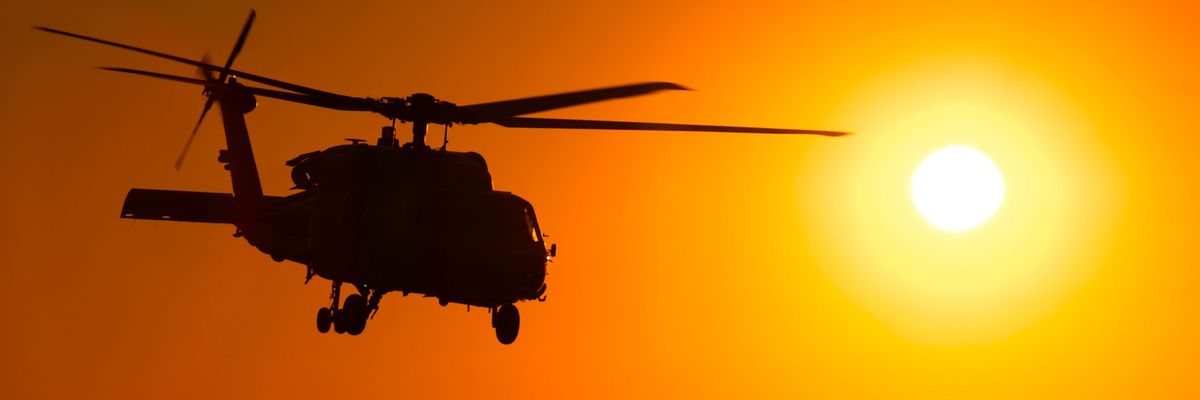Remember how the George W. Bush administration sold its offensive war in Iraq, begun seventeen years ago? It wasn’t just about weapons of mass destruction and mythical alliances with terrorist groups. The war was also supposed to bring the blessings of freedom and democracy to the people of Iraq, who would be grateful to the United States for overthrowing their dictator. The war was to be not just a pursuit of American objectives in opposition to Iraqi ones but an altruistic action for the benefit of Iraqis.
Whatever gratitude Iraqis felt, however, was soon overshadowed by more negative sentiments. American forces were met less with flowers and sweets than with a multi-faceted insurgency. That insurgency encompassed a sectarian civil war that the U.S. invasion unleashed as well as armed opposition to what many Iraqis regarded as a foreign military occupation.
Today, two U.S. administrations later, it is clearer than ever that the U.S. military presence in Iraq is in fact an occupation. Although the Trump administration still uses rhetoric about helping the Iraqi people, it is actively opposing what has become the dominant Iraqi sentiment, as expressed by the Iraqi government and parliament, that U.S. troops should leave. President Trump has gone so far as to threaten Iraq with sanctions if it does not acquiesce in the continued presence of U.S. troops on its soil. The administration has moved to make good on that threat by warning Iraq that it will shut down the Iraqi central bank’s access to its account with the Federal Reserve if Baghdad continues calling for the departure of U.S. forces.
Foreign military occupations are mostly bad, and it is generally bad for the United States to be an occupier. There are, at a minimum, the direct costs of maintaining such a presence in a foreign land. U.S. troops also can become targets of unfriendly foreign powers — a vulnerability that last week’s Iranian missile attacks against U.S.-inhabited military bases in Iraq underscored. At least as likely is violent opposition from indigenous elements opposed to foreign occupation. Finally, such arrangements send an unhelpful message to other nations about how the United States runs roughshod over the wishes and interests of countries it claims to be helping.
U.S. troops ostensibly are still in Iraq to help combat ISIS. But since the recent escalation of the U.S. confrontation with Iran, such help has not been happening. Anti-ISIS operations have been suspended and U.S. troops have been hunkering down to protect themselves.
To impose an anti-ISIS U.S. troop presence against the will of a reluctant Iraqi government ignores how any re-emergence of an ISIS mini-state would be more of a threat to Iraq than to the United States. This is not a situation in which dangers specific to the United States must override the sentiments and interests of a local partner. For ISIS, building and maintaining a so-called caliphate in the Middle East has been more of an alternative to overseas terrorist operations than a complement to such operations. The biggest impediment to any resurgence of ISIS in Iraq would be good governance and stability in Iraqi politics. U.S. troops are not contributing to those goals. Instead, by making Iraq into an arena for battling Iran, the U.S. presence fuels the sorts of instability and sectarian tensions that make Iraq a more favorable playing field for ISIS. Moreover, resistance to foreign occupation has traditionally been one of the chief motivations for terrorism.
The administration’s current stubborn insistence on keeping American troops in Iraq exhibits several damaging patterns of thought.
It shows that much of the mindset that led to the Iraq War — probably the most misguided and damaging U.S. foray in the Middle East ever — has not yet dissipated, despite the enormous costs and failures of that war.
It exhibits arrogance of power, with apparent blindness to how resentful reactions to some exercises of that power redound to the disadvantage of the United States.
It mistakenly equates U.S. influence with a U.S. military presence.
It entails misunderstanding of the sources of terrorist threats and what is required to diminish those threats.
It is another example of how the administration’s obsession with promoting conflict with Iran leads it to ignore or misunderstand many realities of importance to U.S. interests. In this case, what is most ignored is the complex nature of Iraqi-Iranian relations. Both sides want a stable and even cordial relationship because neither side wants a repeat of their very destructive war in the 1980s. But Iraqis don’t want Iranian domination any more than they want American domination.
Iraqi nationalism is the most effective check on Iranian influence on Iraq — if only the United States does not mess up this dynamic with actions that turn that nationalist sentiment against itself. The Bush administration messed up with its invasion in 2003, and the Trump administration has messed up with its lethal attacks on Iraqi militias and its assassination of Qassem Soleimani and a senior Iraqi security figure.
For all these reasons, the U.S. occupation of Iraq should end, and the American troops there should come home.
















